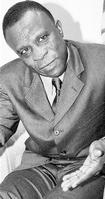Tony Becca, Contributing Editor

Prime Minster of Grenada, Dr. Keith Mitchell. - Norman Grindley /Deputy Chief Photographer
THE PRIME Minister of Grenada, Dr. Keith Mitchell, gave the West Indies Cricket Board (WICB) a lecture in leadership during the board's workshop at the Royal Antigua Hotel in St. John's, Antigua, earlier this week.
Speaking during a lunchtime signing of an agreement between the board and the West Indies Players Association (WIPA) involving collective bargaining, a memorandum of understanding, and a code of ethics for players and officials, Prime Minister Mitchell, also chairman of CARICOM's heads of government committee on cricket, commended the board and WIPA for settling their long-standing difficulties and wished them well in the future before moving into a long lecture on leadership to the board.
After starting off by saying that he wished to take off his "political hat and replace it with my cricket hat, small though it may be to yours", the PM went on to ask what has happened to West Indies cricket since the days under the leadership of Clive Lloyd and Viv Richards? And then said that he believed that enthusiasm, a positive attitude, controlled aggression, enjoyment of the contest, a strong will to win and a natural and athletic way of playing the game were key factors in those talented and successful teams.
Resist temptation
"Those are the strengths that Worrell, Sobers, Lloyd and Richards brought out of their players," said the Prime Minister, who went on to say that "ignoring our past can be very dangerous", and that "we must resist the temptation to forget or devalue the achievements of our past players and we must understand that they still have a lot to offer".
In an obvious reference to the use, or rather the lack of use of past West Indies greats by the board, and the dependency on foreign experts, Dr. Mitchell said that "if we take our past out of the performance equation or try to model someone's past, we will write ourselves a prescription for failure", and that "that will be compounded if at the same time we fail to create clear goals for our future - where we want to go and what we want to become.
He further stated that "cricket is both a science and an art. But in recent years the art form of the game has suffered because of the overwhelming attention that has been given to the scientific aspects of the game.
Art in cricket
"For years, however, art has been an important part of West Indies cricket culture. It is responsible for our players' style and flair. Let's protect it and re-establish some balance between the art and the science of the game.
"Today the need for good leadership and the difficulty of providing that leadership is stronger than it has ever been. All organisations, including cricket organisations, are being forced to reconsider traditional beliefs, values, priorities, strategies and methods. Creating the best strategies and figuring out the right things to do in today's rapidly changing cricket environment are very difficult. And getting members of cricket boards and other stakeholder organisations to accept new ideas, new realities, and new ways of doing things is equally difficult."
According to PM Mitchell, "proper insight into reality and good communication are two of the most important skills needed for good leadership and if they are absent, poor performance results
and conflict and all sorts of problems
follow."
Fundamental steps
Looking at the way forward, the Prime Minister, a regional cricketer in his young days, suggested that the WICB start by taking two fundamental steps - one of which is change and the other is building a strong and cooperative team of motivated people, on and off the field, to implement that agenda for change.
"In the agenda for change we should first create a clear vision of what and where we want to be in the next 10 or 15 years. We must then transmit that vision to the players and to every person inside the organisation. Second, that vision must take into account the long-term needs and interests of the important stakeholders - current players, future players, WIPA, local boards, the sponsors, the clubs, the schools, the public, the press and the governments."
After saying that there must be a clear and simple strategy for achieving that vision, Prime Minister Mitchell said two more things: that the strategy must take into account all of the relevant forces in the cricket organisation as well as the powerful and sometimes competing forces in the environment in which it functions, and that everyone in the room should remember that West Indies cricket does not belong to them, but rather to the people of the region.

